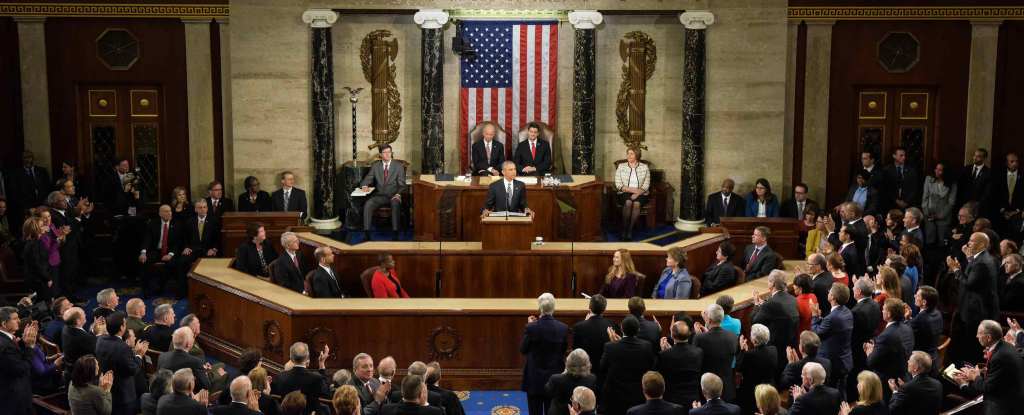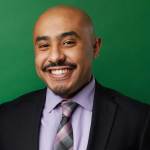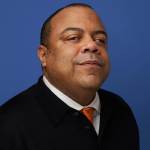 © Bao Dandan/Xinhua Press/Corbis
© Bao Dandan/Xinhua Press/CorbisLast night, President Barack Obama’s final State of the Union address tackled a range of issues that are key to the broader social justice agenda. Here, Ford Foundation staff weigh in on his takes on criminal justice reform, raising the minimum wage, climate change, discrimination—and of course, inequality.
Linking climate change and inequality
“Most of America’s business leaders, the majority of the American people, almost the entire scientific community, and 200 nations around the world” agree that climate change is a problem, Obama said. 2014 was the hottest year on record—until 2015 turned out to be even hotter. Yes: Emissions into the atmosphere from burning oil and coal are heating the planet. But what many don’t know—and what was missing from The State of the Union Address—is the fact that after oil and coal, the greatest source of carbon pollution is from clearing tropical forests. If tropical deforestation were a country, its emissions would be almost as great as those of the US, the second largest carbon polluter on the planet. The vast rainforests of the world are being burnt, cut down, and cleared for industrial plantations, mining and logging concessions. This is a major driver of climate change. But forest loss goes hand in hand with a loss of lives and livelihoods. The indigenous and traditional peoples who live in these forests face increasing violence and assassination as they defend their lands, rights, and resources.
Two nights before the State of the Union, it was the actor Leonardo DiCaprio who made the political link between climate change and inequality in his speech accepting a Golden Globe for his role in the survival film The Revenant. “I want to share this award with all the First Nations people represented in this film and all the indigenous communities around the world,” he said. “It is time that we recognize your history and that we protect your indigenous lands from corporate interests and people that are out there to exploit them. It is time that we heard your voice and protect this planet for future generations!” Final score: POTUS 1. Leo 2.
— Penny Davies
Program Officer, Equitable Development
Reforming the criminal justice system
Early in his speech, the president talked about criminal justice reform as a rare area of bipartisan consensus. And while the speech did not touch on specific proposals for criminal justice reform (nor expand on the vision he has outlined elsewhere), the Obama administration’s leadership on the issue is undeniable. Obama has become one the most prominent advocates for reform of the nation’s criminal justice system, remarking last year at the annual conference of the NAACP that it is “one aspect of American life that remains particularly skewed by race and by wealth, a source of inequity that has ripple effects on families and on communities and ultimately on our nation.” His words were hard-hitting: “What is that doing to our communities? What’s that doing to those children? Our nation is being robbed of men and women who could be workers and taxpayers, could be more actively involved in their children’s lives, could be role models, could be community leaders…So our criminal justice system isn’t as smart as it should be. It’s not keeping us as safe as it should be. It is not as fair as it should be. Mass incarceration makes our country worse off, and we need to do something about it.” His words stood in stark contrast to decades of “tough-on-crime” rhetoric and overly punitive sentencing policies pushed by previous presidents and politicians of all stripes.
Last July, Obama became the first sitting president to visit a federal penitentiary. 2015 also saw the president commuting the sentences of more than 100 people doing time in federal prisons for non-violent drug offenses. He has also talked specifically about the need to revise mandatory minimum sentencing, improve prison conditions, review the use of solitary confinement, restore voting rights for people with felony convictions, and ensure that formerly incarcerated people have a fair chance to work. Leading up the State of the Union, First Lady Michelle Obama announced that her guests for the address would include Connecticut Governor Dannel Malloy, who has launched an initiative to explore bail bond reform and raise the age of juvenile jurisdiction to 20; Sue Ellen, a formerly incarcerated advocate who heads a program that provides educational, social, and professional support for women in Arizona prisons; and Mark Luttrell, the mayor of Shelby County, Tennessee, who is spearheading efforts to reduce recidivism by providing resources for rehabilitation and reentry.
All of this illustrates a significant shift in the nation’s outlook on justice. It’s up to all of us to seize this opportunity: to pursue comprehensive policy reform that’s grounded in equity, public safety, proportionality, and the needs and experiences of the people who are impacted the most.
— Altaf Rahamatulla
Program Associate, Gender, Racial and Ethnic Justice
Securing a fair minimum wage and paid leave
Building an economy that works for all people—has been central to President Obama’s administration and agenda, and it was reflected strongly in his final State of the Union address. Right out of the gate, the president reaffirmed his commitment to ensuring equal pay for equal work, paid leave, and raising the minimum wage, and said he will do what it takes to get it done before he leaves office. His leadership, and that of the Department of Labor, are helping to ensure that common sense solutions like these are part of strengthening an inclusive economy in our country—with particular attention to those who have traditionally been excluded from economic benefits and prosperity, notably women, immigrants, people of color, youth, and the aging.
But it’s important to note that the increasingly high profile of issues like paid leave, sick time, and family leave—along with the president’s willingness to champion a bolder and more meaningful minimum wage—result directly from the efforts of people who are organizing in their workplaces, communities and advocates who are taking to the streets, employers who are speaking out and putting in place high road business models, and cities and states that are leading the way in policies and practice. Fifteen dollars is now the new norm for a fair minimum wage. There is widespread recognition that all workers need to be able to take a day off to go to the doctor or care for a loved one, without losing income or fearing retaliation. The political establishment’s embrace of these truths is a great victory for those who have worked so long and hard to get to this point.
It was astute, however, for Obama to also set his sights on broader, more long-term challenges, noting the “economic disruptions that strain working families,” changes that have resulted in dramatic shifts in the nature of work itself, and a broken social contract that once hung economic security and protection on stable employment. He called out a “race to the bottom” in an increasingly low-road economy—where companies are not accountable, workers have little leverage and their labor is squeezed, income inequality continues to widen (especially along lines of race and gender), youth find few economic prospects, and only the very few will have the privilege of a decent retirement in their later years. The president underscored the imperative of reorienting toward a new kind of economy, one in which workers, start ups and small businesses (instead of large corporations and special interests) have real voice and power in defining the rules of the game and ensuring that the economy works for them. He called for the “high road” to prosperity, along which businesses realize that doing right by their workers, their communities, and their customers, is ultimately good for their shareholders—and for the economy overall.
And even after this administration has left office, our grantees will continue to be key partners in ensuring that the short term policy changes achieved under Obama’s watch, as well as the long term solutions that will ensure an inclusive economy and shared prosperity, are realized and strengthened.
— Laine Romero-Alston
Program Officer, Inclusive Economies
Embracing opportunity, and each other
The constraints of power have never been clearer than in last night’s address. President Obama gave us the good, the bad, and the ugly. The Good: Yes to ensuring that our nation is better prepared for technological advances, that we reform the broken immigration system, that we give all Americans a voice in national decision-making by reducing big money in politics and protecting voter access. The Bad: No mention of the white, black, Latino, immigrant, Muslim, Sikh, and transgendered lives stolen from us in the past year by political extremists and unaccountable policing. The Ugly: The level of hate directed at American Muslims has escalated, to the point that Obama had reason to cite the disturbing ways that global threats abroad are being linked to the fate of responsible, loyal, and hardworking American Muslims at home. In many ways, last night could be seen as politics as usual.
But within that usual, I saw a glimpse of what could be: A subtle shift in tone where the President of the United States pleads for citizen action that forges an intersectional America bound together by our common creeds. A call to “vote, speak out, stand up for the most vulnerable” among us. An acknowledgement that whether one is a 68-year-old white man or a 17-year-old black woman, our destinies are connected. We face the future together.
I agree with our president: “No more peddling fiction.” We can’t afford to play political games, and I like to think the last minutes of Barack Obama’s final State of the Union speech affirmed this point. That was the “great” from last night. Instead of partisan political positioning, it’s time to lean into our American identity, and to do so in ways that allow each of us to embrace both opportunity and each other. Failing to rise to the challenge will only lead to economic stagnation and social segregation—a lost chance to do right by ourselves and our children. It is time for people to lead. This is our moment. Over the past two years I’ve never believed in myself and my country more than I do now.
— Eric Ward
Program Officer, Gender, Racial, and Ethnic Justice



